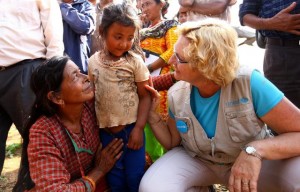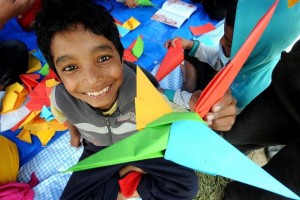UNICEF HK raised 7.8 million to support relief work in Nepal 15 Child-Friendly Spaces set up to help children recover from trauma
2015-05-04
| HONG KONG, 4 May 2015 — One week on from the earthquake in Nepal, UNICEF says health and wellbeing of children affected by the disaster are hanging in the balance – as many have been left homeless, in deep shock with no access to basic care. UNICEF has set up 15 Child-Friendly Spaces (CFS) at the most severely affected areas, to help children cope with the aftermath. As of today, the Hong Kong Committee for UNICEF (UNICEF HK) has raised HK$7.8 million to support UNICEF’s Nepal relief work and to protect Nepali children, which includes public donations and HK$1 million allocated from its emergency relief fund. |  ©UNICEF/NYHQ2015-1097/Panday |
The April 25 earthquake caused devastating damages to Nepal, nearly 80 per cent districts of the country are affected – the number of affected districts increased to 57 out of 75, 12 of which are declared severely affected, according to UNICEF teams’ assessment in Nepal. The earthquake has flattened more than 130,000 homes and left 3 million people in need of food assistance. Children are the most vulnerable in disaster – many children often start crying with a slight shaking of the ground due to aftershocks. There is urgent need for children in the most affected districts to return to their normalcy as quick as possible by setting up CFS and temporary learning.
 ©UNICEF/NYHQ2015-1078/Karki |
UNICEF has established 15 CFS for the benefits of thousands displaced children in Kathmandu Valley. They are filled with lots of art activities, games, sports for children to pass their time and play with, as well as provide psychological support – to protect children and help them overcome the shock and trauma of living through earthquake. More supplies to set up additional CFS beyond the Valley are now in transit. UNICEF has also distributed school and early childhood development kits, child kits and tarpaulins in Kathmandu and Lalitpur camps, which are useful to start temporary learning centres in informal camps. |
Ms Judy Chen, Chairman of UNICEF HK announced that, "Many children’s lives have changed forever. They have lost family members and their homes, they are severely affected by the stress of living through the earthquake. We need to protect Nepali children, help them to return to normalcy. UNICEF HK has allocated HK$1 million from the emergency relief fund, together with over HK$6.8 million raised from the public, we have raised HK$7.8 million for the mission so far. And, more local corporations have been joining our relief effort in Nepal.”
To help quake-affected children and families in Nepal, please make online donation at unicef.org.hk/donate. Besides, from today to end of May, donation boxes will be placed at nearly 250 outlets of Maxim’s Group to collect public donation. UNICEF has launched a HK$393 million (US$50.35 million) appeal to support its humanitarian response to the earthquake in Nepal for the next three months.
Donation for Nepal Earthquake
| Online donation: | /donate |
| Direct Bank-in: | HSBC: 567-354014-005 |
| Bank of China: 012-875-0-021868-3 | |
| Wing Lung Bank: 020-601-003-7634-8 | |
| Bank of East Asia: 015-260-81-012100 | |
| Hotline: | 2833 6139 |
(In the unusual event that donations for Nepal Earthquake exceed the needs, we will direct your gift to disaster or emergency relief actions elsewhere.)
- END -
------------------------------
For more information please contact:
Hong Kong Committee for UNICEF
| Jamie Wong, Communication Specialist | Tel / Mobile: 2836 2967 / 6149 3378 | Email: [email protected] |









